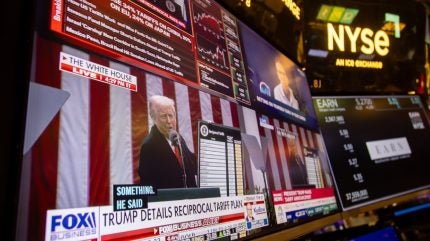
The effects of the trade tariffs being proposed by the Trump administration in the US on the production costs of goods relative to sales revenues will be detrimental to “most organisations”, the CEO of the Association for Supply Chain Management (ASCM) has said.
Speaking on an episode of GlobalData’s Instant Insights podcast, Abe Eshkenazi questioned whether US consumers will be happy to pay more for products purely for them to have been made domestically – and, by extension, whether consumers elsewhere will be happy to foot the bill for the inflationary effects of the tariffs.
“We’ve been benefiting from labour arbitrage for 15, maybe 30 years right now,” Eshkenazi explained. “In bringing manufacturing back to the United States, obviously we have a higher labour cost. Where we may save some on logistics, I don’t think the arbitrage is going to be beneficial for most organisations today.”
Eshkenazi also noted that businesses are being asked to make significant investment decisions without being given adequate certainty. Not only is there continued flux between the announcement of tariffs, delays to their implementation and the rolling back of them, but there is also little clarity as yet on what the final tariff rates for each country will be – with each individual rate having ramifications beyond just the US and the trading partner in question.

“The challenge that we have today is that supply chains are trying to respond to the short-term challenges that they have with a long-term investment strategy, and they’re coming at loggerheads,” he said, continuing: “I think what’s concerning a lot of supply chain professionals is that your planning horizons have been shrunk because of the uncertainty, and so it’s extremely difficult to make a long-term investment bet if you’re uncertain about the outcomes or your market in the future.”
While Eshkenazi acknowledged that tariffs are nothing new for businesses and industries and are simply part of international trade to varying extents, he noted that the lack of structure and due process in the rollout of Trump’s reciprocal tariffs is a major issue.
“This is not the first time that we’ve dealt with tariffs,” he said. “I think what’s confusing the marketplace right now is: what are the rules of the road for the long term, not just the short term? And I think this is where we’re seeing a lot of consternation. Is this a short-term change, or is this a long-term change that I need to account for?”
Supply chain impacts of tariffs
The challenge in planning for the long term is compounded by the fact that the potential tariff impacts and factors at play differ from industry to industry. By way of example, Eshkenazi pointed to apparel and healthcare.
“Apparel is based on a supply chain that uses low-cost labour in developing countries,” he explained. “In certain cases, you have individuals making less than 50 cents a day, and so, therefore, to redesign that supply chain and to bring it back – where? The labour arbitrage is significant in that particular industry.
“Healthcare. We’ve heard that there may be potential tariffs on pharmaceutical products. This is concerning. China today has the majority of the APIs, the active pharmaceutical ingredients. Although we source a significant portion of our healthcare products from India, they rely on China for the raw materials, so you can’t get away from it.
“Depending on the industry that you’re taking a look at, it’s going to be critical that you evaluate what the impact is going to be, not only in terms of realigning the supply chain, but the cost associated with developing that ecosystem.”
Elaborating on that point, Eshkenazi added that any fundamental reshaping of supply chains globally is a major undertaking involving the unwinding of investment and reimplementation of infrastructure.
“We spent 30 years developing the manufacturing hub of the world in China, and the ecosystem around it,” he said. “It’s not going to be undone in quarters. I think that’s part of the challenge that we have here – that there’s an intent to redesign the supply chain that we invested in collectively for over 30-plus years.”
Navigate the shifting tariff landscape with real-time data and market-leading analysis. Request a free demo for GlobalData’s Strategic Intelligence here.



